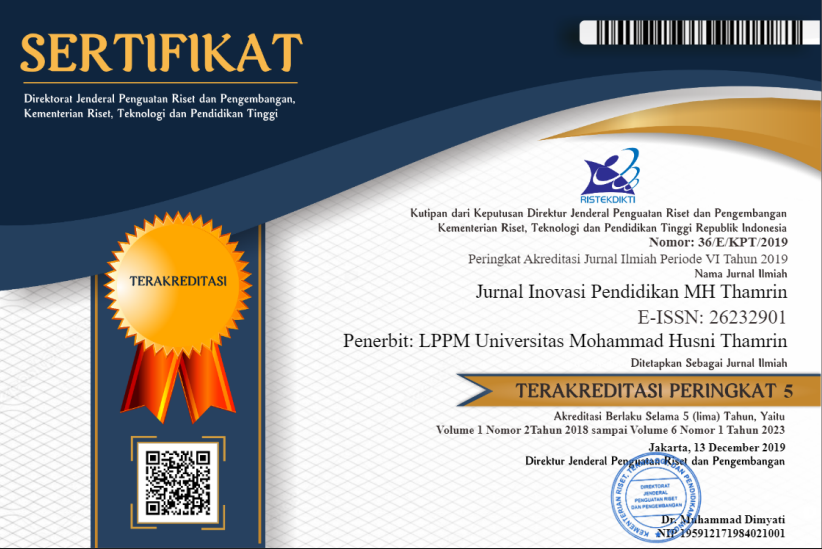Penerapan Pembelajaran Autonomi dalam Meningkatan Keterampilan Membaca Text Bahasa Inggris
DOI:
https://doi.org/10.37012/jipmht.v2i2.41Keywords:
autonomous learning, English text, students, faculty of economicsAbstract
References
Aguirre, J., & Ramos, B. (2009). Guidance in reading strategies: A first step towards autonomy learning in a semi-distance education program. PROFILE Issues in Teachers’ Professional
Development, 11(1), 41-56.
Alderson, J. C. (2000). Assessing reading. Cambridge, UK: Cambridge University Press.
Burns, A. (2010). Doing action research in English language teaching: A guide for practitioners. New York, NY: Routledge.
Cantrell, S. C., & Carter, J. C. (2009). Relationships among learner characteristics and adolescents’ perceptions about reading strategy use. Reading Psychology, 30(3), 195-224.
Carrell, P. L. (1989). Metacognitive awareness and second language reading. The Modern Language Journal, 73(2), 121-134.
Cohen, L., Manion, I., & Morrison, K. (2007). Research methods in education (6th ed.). London, UK: Routledge Falmer.
Dickinson, L. (1995). Autonomy and motivation: A literature review. System, 23(2), 165-174.
Guilloteaux, M. J., & Dörnyei, Z. (2008). Motivating language learners: A classroom-oriented investigation of the effects of motivational strategies on student motivation. TESOL Quarterly,
(1), 55-77.
Guthrie, J., Wigfield, A., Metsala, J. L., & Cox, K. E. (1999). Motivational and cognitive predictors of text comprehension and reading amount. Scientific Studies of Reading, 3(3), 231-
Hedge, T. (2003). Teaching and learning in the language classroom. New York, NY: Oxford University Press.
Holec, H. (1981). Autonomy and foreign language learning. Oxford, UK: Pergamon.
Jiménez, P. (2000). Teaching reading strategies. Bogotá, CO: Universidad Externado de Colombia.
Little, D. (1991). Learner autonomy: Definitions, issues, and problems. Dublin, IE: Authentik.
Nunan, D. (1999). Second language teaching and learning. Boston; MA: Heinle Cengage Learning.
Nuttall, C. (1982). Teaching reading skills in a foreign language. London, UK: Heinemann.
Nuttall, C. (1996). Teaching reading skills in a foreign language (2nd ed.). Oxford, UK: Heinemann.
RÃos, S. R., & Valcárcel, A. M. (2005) Reading: A meaningful way to promote learning English in high school. PROFILE Issues in Teachers’ Professional Development, 6(1), 59-72.
Stern, P. N., & Porr, C. (2010). Essentials of accessible grounded theory. Walnut Creek, CA: Left Coast Press.
Wallace, M. J. (2002). Action research for language teachers. Cambridge, UK: Cambridge University Press.
Wentzel, K. R. (1996). Social goals and social relationships as motivators of school adjustment.
In J. Juvonen & K. Wentzel (Eds.), Social motivation: Understanding children’s school adjustment (pp. 226-247). New York, NY: Cambridge University Press.
Williams, E. (1996). Reading in the language classroom. Malaysia: Modern English Publications.
Admin. 2015. Maret 17. Metode Pembelajaran. Diakses Maret 13, 2018, dari Id Tesis: http://idtesis.com/metode-pembelajaran-mind-mapping/
Afandi, M dan Jupriyanto. 2013. Pedagogig Guru. Semarang : UNISSULA.
Anurrahman. 2010. Belajar dan Pembelajaran. Bandung : Alfabeta.
Arikunto, Suharsimi. 2011. Dasar-dasar Evaluasi Pendidikan. Jakarta : PT Bumi Aksara.
Asy'ari, Maslihah. 2014. Penerapan Pendekatan Sains Teknologi Masyarakat Dalam Pembelajaran Sains Di Sekolah Dasar. Jakarta : Universitas Santa Dhama.
Badan Standar Nasional Pendidikan. 2013. Panduan Penyusunan Kurikulum Tingkat Satuan Pendidikan. Jakarta : Depdiknas.
Buzan, Tony. 2010. Buku Pintar Mind Map. Jakarta : PT. Gramedia Pustaka Utama.
Buzan, Tony. 2010. Buku Pintar Mind Map Untuk Anak: Agar Anak Jadi Pintar Disekolah.
Jakarta : PT. Gramedia Utama.
DePorter, Bobbi & Mike Hernacki. 2013. Quantum Learning: Membiasakan Belajar Nyaman
dan Menyenangkan. Bandung : Kaifa.
Downloads
Published
How to Cite
Issue
Section
Citation Check
License
Jurnal Inovasi Pendidikan MH Thamrin allows readers to read, download, copy, distribute, print, search, or link to the full texts of its articles and allow readers to use them for any other lawful purpose. The journal allows the author(s) to hold the copyright without restrictions. Finally, the journal allows the author(s) to retain publishing rights without restrictions Authors are allowed to archive their submitted article in an open access repository Authors are allowed to archive the final published article in an open access repository with an acknowledgment of its initial publication in this journal.

Jurnal Inovasi Pendidikan MH Thamrin is licensed under a Creative Commons Attribution 4.0 International License.











